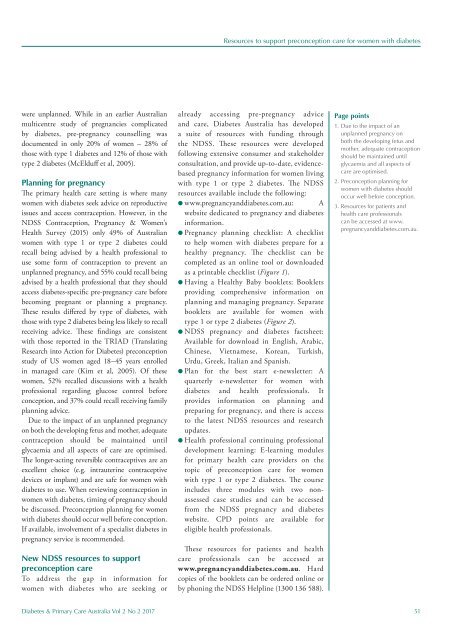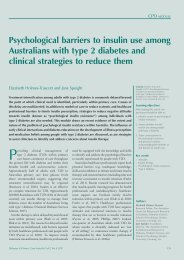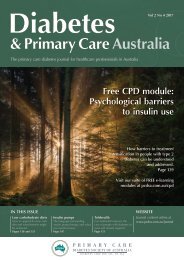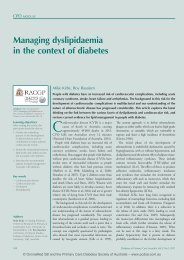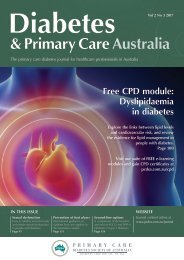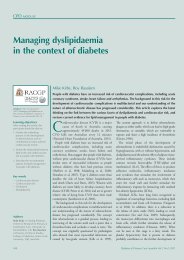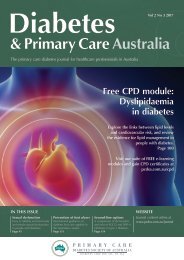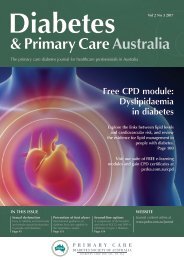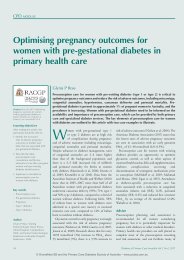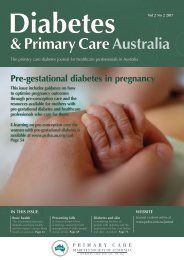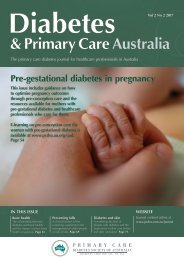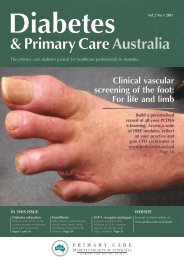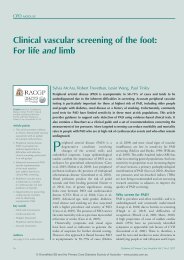DPCA2-2_issue_v3
Create successful ePaper yourself
Turn your PDF publications into a flip-book with our unique Google optimized e-Paper software.
Resources to support preconception care for women with diabetes<br />
were unplanned. While in an earlier Australian<br />
multicentre study of pregnancies complicated<br />
by diabetes, pre-pregnancy counselling was<br />
documented in only 20% of women – 28% of<br />
those with type 1 diabetes and 12% of those with<br />
type 2 diabetes (McElduff et al, 2005).<br />
Planning for pregnancy<br />
The primary health care setting is where many<br />
women with diabetes seek advice on reproductive<br />
<strong>issue</strong>s and access contraception. However, in the<br />
NDSS Contraception, Pregnancy & Women’s<br />
Health Survey (2015) only 49% of Australian<br />
women with type 1 or type 2 diabetes could<br />
recall being advised by a health professional to<br />
use some form of contraception to prevent an<br />
unplanned pregnancy, and 55% could recall being<br />
advised by a health professional that they should<br />
access diabetes-specific pre-pregnancy care before<br />
becoming pregnant or planning a pregnancy.<br />
These results differed by type of diabetes, with<br />
those with type 2 diabetes being less likely to recall<br />
receiving advice. These findings are consistent<br />
with those reported in the TRIAD (Translating<br />
Research into Action for Diabetes) preconception<br />
study of US women aged 18–45 years enrolled<br />
in managed care (Kim et al, 2005). Of these<br />
women, 52% recalled discussions with a health<br />
professional regarding glucose control before<br />
conception, and 37% could recall receiving family<br />
planning advice.<br />
Due to the impact of an unplanned pregnancy<br />
on both the developing fetus and mother, adequate<br />
contraception should be maintained until<br />
glycaemia and all aspects of care are optimised.<br />
The longer-acting reversible contraceptives are an<br />
excellent choice (e.g. intrauterine contraceptive<br />
devices or implant) and are safe for women with<br />
diabetes to use. When reviewing contraception in<br />
women with diabetes, timing of pregnancy should<br />
be discussed. Preconception planning for women<br />
with diabetes should occur well before conception.<br />
If available, involvement of a specialist diabetes in<br />
pregnancy service is recommended.<br />
New NDSS resources to support<br />
preconception care<br />
To address the gap in information for<br />
women with diabetes who are seeking or<br />
already accessing pre-pregnancy advice<br />
and care, Diabetes Australia has developed<br />
a suite of resources with funding through<br />
the NDSS. These resources were developed<br />
following extensive consumer and stakeholder<br />
consultation, and provide up-to-date, evidencebased<br />
pregnancy information for women living<br />
with type 1 or type 2 diabetes. The NDSS<br />
resources available include the following:<br />
l www.pregnancyanddiabetes.com.au: A<br />
website dedicated to pregnancy and diabetes<br />
information.<br />
l Pregnancy planning checklist: A checklist<br />
to help women with diabetes prepare for a<br />
healthy pregnancy. The checklist can be<br />
completed as an online tool or downloaded<br />
as a printable checklist (Figure 1).<br />
l Having a Healthy Baby booklets: Booklets<br />
providing comprehensive information on<br />
planning and managing pregnancy. Separate<br />
booklets are available for women with<br />
type 1 or type 2 diabetes (Figure 2).<br />
l NDSS pregnancy and diabetes factsheet:<br />
Available for download in English, Arabic,<br />
Chinese, Vietnamese, Korean, Turkish,<br />
Urdu, Greek, Italian and Spanish.<br />
l Plan for the best start e-newsletter: A<br />
quarterly e-newsletter for women with<br />
diabetes and health professionals. It<br />
provides information on planning and<br />
preparing for pregnancy, and there is access<br />
to the latest NDSS resources and research<br />
updates.<br />
l Health professional continuing professional<br />
development learning: E-learning modules<br />
for primary health care providers on the<br />
topic of preconception care for women<br />
with type 1 or type 2 diabetes. The course<br />
includes three modules with two nonassessed<br />
case studies and can be accessed<br />
from the NDSS pregnancy and diabetes<br />
website. CPD points are available for<br />
eligible health professionals.<br />
These resources for patients and health<br />
care professionals can be accessed at<br />
www.pregnancyanddiabetes.com.au. Hard<br />
copies of the booklets can be ordered online or<br />
by phoning the NDSS Helpline (1300 136 588).<br />
Page points<br />
1. Due to the impact of an<br />
unplanned pregnancy on<br />
both the developing fetus and<br />
mother, adequate contraception<br />
should be maintained until<br />
glycaemia and all aspects of<br />
care are optimised.<br />
2. Preconception planning for<br />
women with diabetes should<br />
occur well before conception.<br />
3. Resources for patients and<br />
health care professionals<br />
can be accessed at www.<br />
pregnancyanddiabetes.com.au.<br />
Diabetes & Primary Care Australia Vol 2 No 2 2017 51


